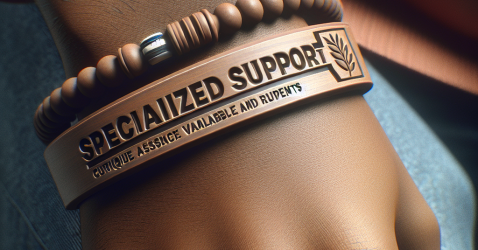Unlocking Your Potential With Personality Assessments
Did you ever wonder what makes you tick? Understanding your natural tendencies, strengths, and areas for growth can be a key factor in unlocking your true potential. Personality assessments provide valuable insights into your unique personality traits and preferences, helping you gain self-awareness and make informed decisions about your personal and professional development. In this article, we will explore the world of personality assessments and how they can empower you to harness your strengths and achieve your goals. So, get ready to embark on a journey of self-discovery and unleash your full potential!
Understanding Personality Assessments
What are personality assessments?
Personality assessments are tools that help individuals gain a deeper understanding of their own unique characteristics, behaviors, and preferences. They provide insights into how we perceive the world, make decisions, and interact with others. These assessments typically involve completing a questionnaire or series of questions designed to measure various aspects of personality.
Why are personality assessments important?
Personality assessments are important because they enable us to gain valuable self-awareness and self-discovery. By understanding our own personality traits, we can better understand how we relate to others and navigate the world around us. These assessments can also enhance communication and relationships, aid in career development and personal growth, and contribute to overall well-being and happiness.
Different types of personality assessments
There are various types of personality assessments available, each with its own unique approach and focus. Some of the most commonly used assessments include:
- Myers-Briggs Type Indicator (MBTI): This assessment classifies individuals into different personality types based on their preferences in four dimensions: extraversion/introversion, sensing/intuition, thinking/feeling, and judging/perceiving.
- DISC Assessment: The DISC assessment measures an individual’s dominant traits across four dimensions: dominance, influence, steadiness, and conscientiousness. It provides insights into how people communicate, behave, and solve problems.
- Big Five Personality Traits: Also known as the Five-Factor Model, this assessment measures five main dimensions of personality: openness, conscientiousness, extraversion, agreeableness, and neuroticism. It offers a comprehensive view of an individual’s personality.
- Enneagram: The Enneagram is a personality system that categorizes individuals into nine different personality types. It focuses on core motivations, fears, and desires, providing a deeper understanding of oneself and others.
Benefits of Personality Assessments
Self-awareness and self-discovery
One of the key benefits of personality assessments is gaining self-awareness and self-discovery. These assessments provide individuals with a better understanding of their own strengths, weaknesses, values, and motivations. By knowing oneself more deeply, individuals can make more informed decisions, set goals aligned with their values, and maximize their potential.
Improved communication and relationships
Personality assessments can greatly enhance communication and relationships. By understanding our own communication styles and preferences, as well as those of others, we can adapt our approach to effectively interact and connect with different personalities. This leads to better understanding, empathy, and harmony in our personal and professional relationships.
Career development and personal growth
Personality assessments play a crucial role in career development and personal growth. They help individuals identify their natural talents, interests, and preferences, guiding them towards suitable career paths. By aligning our careers with our personality traits, we are more likely to experience job satisfaction and fulfillment. Additionally, personality assessments highlight areas for personal growth, allowing individuals to focus on developing specific skills and overcoming challenges.
Common Personality Assessments
Myers-Briggs Type Indicator (MBTI)
The Myers-Briggs Type Indicator (MBTI) is one of the most widely used personality assessments. It assesses individuals on four dimensions to determine their personality type among sixteen possible combinations. The MBTI provides insights into how individuals process information, make decisions, and socialize, helping them understand their natural preferences and tendencies.
DISC Assessment
The DISC Assessment categorizes individuals into one of four main personality types: Dominance, Influence, Steadiness, and Conscientiousness. It focuses on understanding how people communicate, behave, and solve problems. The DISC Assessment can be particularly useful for enhancing teamwork, conflict resolution, and leadership development.
Big Five Personality Traits
The Big Five Personality Traits assessment measures an individual’s personality across five dimensions: openness, conscientiousness, extraversion, agreeableness, and neuroticism. It provides a comprehensive understanding of an individual’s personality and is widely used in psychology research and industry settings.
Enneagram
The Enneagram is a personality system that categorizes individuals into one of nine different personality types. It focuses on core motivations, fears, and desires, providing insights into our deepest desires, strengths, and areas for growth. The Enneagram is often used for personal development, team building, and relationship counseling.
How Personality Assessments Work
Understanding the underlying theories
Personality assessments are based on various underlying theories and frameworks that explain human behavior and personality. These theories help researchers and practitioners develop valid and reliable assessments. It is important to familiarize oneself with these theories to understand the foundation of the assessment and how it relates to one’s personality.
Completing the assessments
Completing a personality assessment typically involves answering a series of questions or statements. These questions are designed to measure different aspects of personality, such as preferences, behaviors, and characteristics. It is important to answer honestly and thoughtfully to obtain accurate results. Some assessments may also involve timed sections or multiple-choice questions.
Interpreting the results
Once the assessment is completed, the results are generated, providing insights into an individual’s personality traits or type. It is essential to interpret the results with the help of trained professionals or reliable resources. These experts can explain the meaning of the results, help individuals understand their implications, and provide guidance on how to apply the findings in various aspects of life.
Applying Personality Assessments
Self-reflection and personal development
Personality assessments can be a powerful tool for self-reflection and personal development. By understanding our own personality traits, we can reflect on how these characteristics impact our thoughts, emotions, and behavior. This self-awareness allows us to identify areas for personal growth, develop self-acceptance, and make intentional choices aligned with our values and strengths.
Understanding strengths and weaknesses
Personality assessments provide valuable insights into our strengths and weaknesses. By identifying our natural talents and strengths, we can capitalize on them in various areas of life, such as career choices, hobbies, and relationships. Understanding our weaknesses also enables us to work on self-improvement, seek support where needed, and cultivate a growth mindset.
Team building and organizational development
Personality assessments are widely used in team building and organizational development. By assessing the personalities of team members, organizations can foster better teamwork, optimize communication, and create a harmonious work environment. These assessments can reveal complementary strengths and potential conflicts, allowing teams to capitalize on diversity and improve overall team performance.
Using Personality Assessments in Career Development
Identifying suitable career paths
Personality assessments play a crucial role in career development by helping individuals identify suitable career paths based on their natural talents and preferences. By understanding our personality traits, such as our interests, work styles, and values, we can make informed decisions about our career choices. This leads to increased job satisfaction, motivation, and success in our chosen professions.
Enhancing job performance and satisfaction
Personality assessments can also contribute to enhancing job performance and satisfaction. By aligning our personality traits with our job responsibilities and work environment, we can leverage our strengths, overcome challenges, and thrive in our roles. Understanding our preferences and work styles can also help us communicate effectively with colleagues and superiors, leading to improved working relationships.
Improving leadership skills
Personality assessments can be valuable tools for leaders to understand their own leadership styles and enhance their skills. By recognizing our natural leadership tendencies and areas for growth, we can adapt our leadership approach to suit different situations and team dynamics. This self-awareness enables leaders to build stronger, more cohesive teams and inspire others to reach their full potential.
Ethics and Cons of Personality Assessments
Validity and reliability concerns
One of the main ethical considerations surrounding personality assessments is their validity and reliability. It is important for assessments to be based on sound scientific research, with evidence supporting their accuracy and consistency. Without proper validation, individuals may receive misleading or inaccurate results, impacting their decisions and perceptions of themselves and others.
Potential for bias and discrimination
Personality assessments have the potential for bias and discrimination, particularly when used for selection or hiring purposes. If not designed and implemented properly, assessments could unfairly favor certain personality types or demographics, leading to unequal opportunities. It is essential for organizations to use assessments responsibly, ensuring fairness and inclusivity throughout the entire process.
Misinterpretation and misuse of results
Another concern with personality assessments is the possibility of misinterpretation and misuse of results. It is crucial for individuals to receive proper guidance and interpretation of their assessment results to avoid drawing inaccurate conclusions or making misguided decisions. Trained professionals or reputable resources can help individuals understand and apply the results appropriately.
Critiques and Controversies
Are personality assessments accurate?
There is ongoing debate regarding the accuracy of personality assessments. While these assessments provide valuable insights into an individual’s traits and tendencies, some argue that they may oversimplify or generalize complex human behavior. It is important to remember that personality assessments should be considered as one tool among many in understanding oneself and others, rather than as definitive measures of personality.
Can personality change over time?
The question of whether personality can change over time is often raised when discussing personality assessments. While personality tends to be relatively stable, research suggests that certain traits may shift or develop in response to life experiences and personal growth. Personality assessments provide a snapshot of our traits at a given point in time, but they do not capture the full complexity of our evolving selves.
Are personality assessments limiting or empowering?
Critics argue that personality assessments can be limiting, as they place individuals into predefined categories or types. This may prevent people from exploring the full range of their potential or embracing change. However, proponents of personality assessments argue that they can be empowering tools for self-understanding and creating awareness of our unique strengths and qualities. Ultimately, the perception of whether personality assessments are limiting or empowering may vary from person to person.
Choosing the Right Personality Assessment
Considering assessment purpose and goals
When choosing a personality assessment, it is important to consider the specific purpose and goals you have in mind. Different assessments focus on different aspects of personality and provide varying depths of insight. Determine whether you are seeking a broad understanding of your personality or if you have specific areas of interest or concern that you would like to explore.
Evaluating assessment validity and credibility
To ensure the assessment you choose is valid and credible, it is essential to evaluate the evidence behind it. Look for assessments that have been developed and tested using rigorous scientific methods, with evidence supporting their reliability and accuracy. Seek assessments that have been reviewed by experts in the field and have a solid reputation for providing meaningful and helpful results.
Seeking professional guidance if needed
If you feel unsure about interpreting or applying the results of a personality assessment, it is wise to seek professional guidance. Trained psychologists or career counselors can assist you in understanding your results, identifying practical applications, and navigating any challenges or concerns that may arise. Their expertise can help you make the most of your assessment experience.
Conclusion
Personality assessments offer valuable insights into our unique characteristics, behaviors, and preferences, supporting personal growth, relationship development, and career success. By understanding our own personalities, we can navigate the world more effectively, build stronger connections with others, and make informed decisions aligned with our values and strengths. While personality assessments have their limitations and ethical considerations, when used responsibly and in conjunction with other tools, they can contribute significantly to our overall well-being and unlock our full potential. So, embrace the opportunity to gain self-awareness through personality assessments and embark on a journey of self-discovery and personal growth. Your unique personality is your greatest asset – unlock its potential today!

















